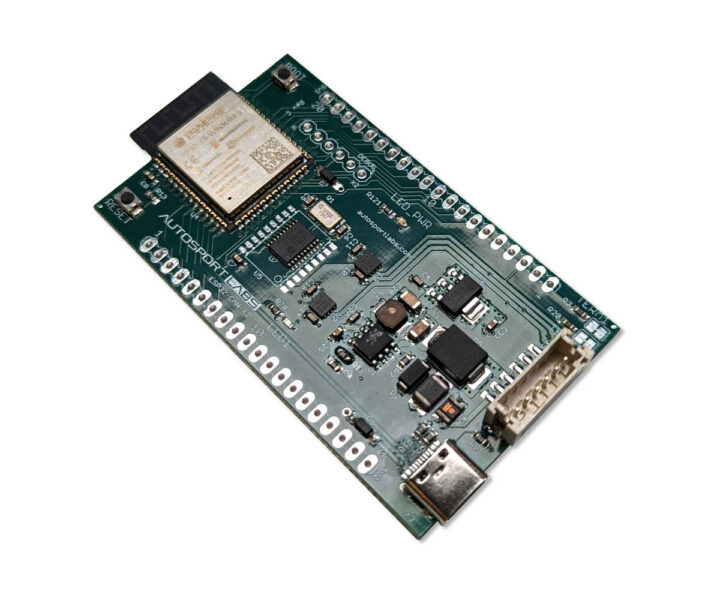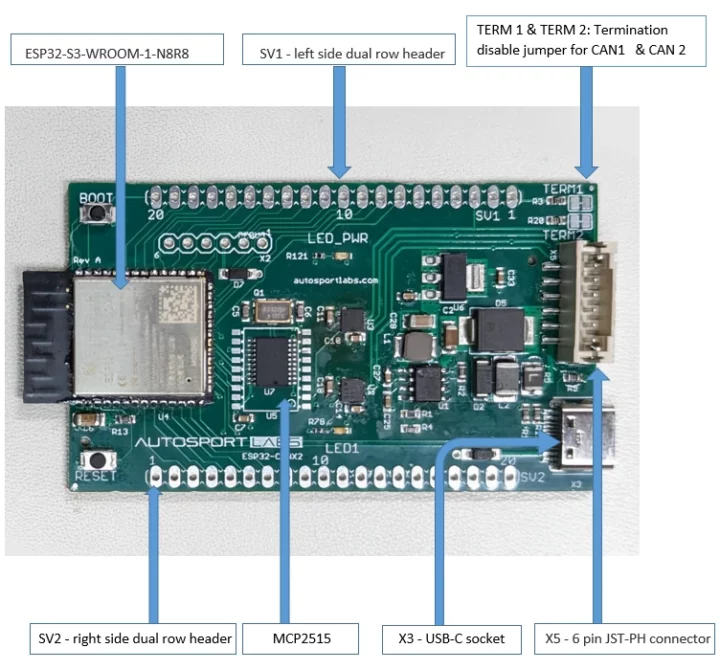Autosport Labs, a company that makes products for motorsport acquisition and real-time telemetry, has launched the ESP32-CAN-X2 board with an ESP32-S3 microcontroller, two CAN bus interfaces, and an automotive-grade power supply with a 6V to 20V DC input range.
ESP32 boards with CAN Bus have been around for years starting with the Olimex ESP32-EVB Board which we covered in 2017, and followed by boards such as the CAN32 board, CanLite ESP32, or RejsaCAN-ESP32-S3. The ESP32-CAN-X2 adds another option with ESP32-S3 and two CAN Bus interfaces.
ESP32-CAN-X2 board specifications:
- Wireless module – ESP32-S3-WROOM-1-N8R8
- MCU – ESP32-S3 dual-core Tensilica LX7 microcontroller up to 240 MHz with 384KB ROM, 512KB SRAM, 16 KB SRAM in RTC
- Memory – 8MB PSRAM
- Storage – 8MB flash
- Wireless – WiFi 4 and Bluetooth LE 5
- PCB antenna
- USB – USB Type-C port for flashing and power
- CAN Bus
- 6-pin header for 2x CAN V2.0B communication
- 1x CAN bus is built into the ESP32-S3 MCU
- 1x CAN Bus is provided through MCP2515 connected over SPI
- Integrated CAN transceivers
- Configurable CAN termination resistors, which can be disabled via breakable jumpers
- Expansion – All pins are broken out to a DIP form factor and for a future range of stackable “bolt-ons” (like hats) add-on boards
- Misc
- Power LED, user LED
- Reset and Boot push button
- Automotive-grade Power Supply
- 6-20V DC via USB-C port or VIN pin (peaks up to 40V Vmax)
- 3.3V Voltage regulator
- Power consumption – 330mW typ, up to 1.65W
- Dimensions – 72 x 42.10 mm
- Temperature Range – -40°C to +85°C
The company provides Arduino and CircuitPython examples on GitHub to help users get started quickly with a ping pong example that sends packets between the CAN1 and CAN2 interfaces of the board. More technical details about the hardware and instructions to get started with the Arduino and CircuitPython can be found in the wiki.
The ESP32-S3 dual CAN Bus board targets automotive and industrial applications with some potential projects including creating a button panel to broadcast messages to a PDM, triggering a relay (with additional support circuitry) via a CAN bus message, bridging two CAN bus networks with different baud rates, collecting data from two different CAN bus networks with different baud rates, isolating traffic between CAN networks, and creating a “man in the middle” agent to identify the source of CAN messages to reverse-engineering CAN Bus implementations.
Autosport Labs sells the ESP32-CAN-X2 board on its website for $49.95.

Jean-Luc started CNX Software in 2010 as a part-time endeavor, before quitting his job as a software engineering manager, and starting to write daily news, and reviews full time later in 2011.
Support CNX Software! Donate via cryptocurrencies, become a Patron on Patreon, or purchase goods on Amazon or Aliexpress







